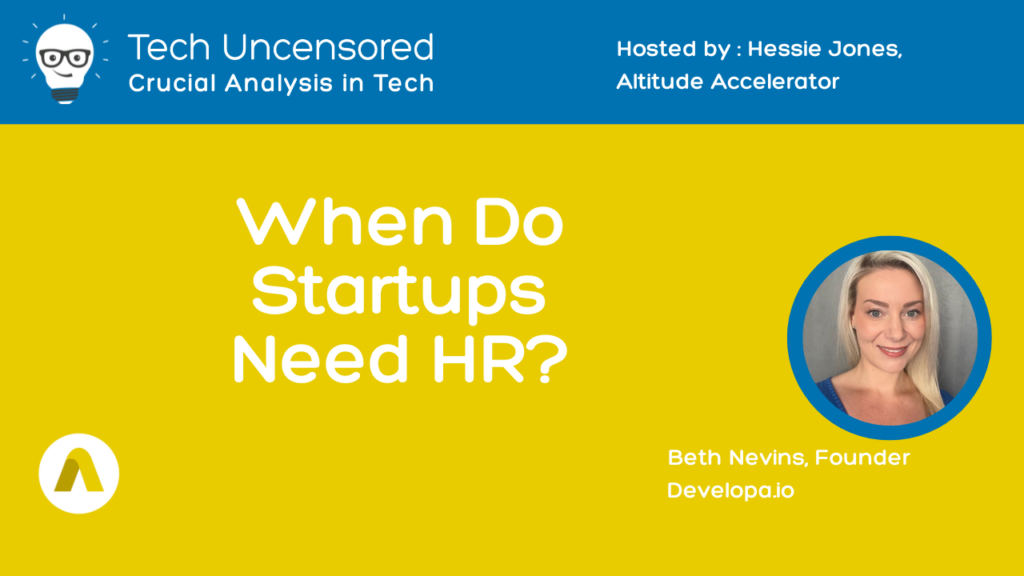Home » When Should Startups Consider Implementing HR? Featuring Beth Nevins, Founder of Developa.io
When Should Startups Consider Implementing HR? Featuring Beth Nevins, Founder of Developa.io

In a recent discussion, Beth Nevins, founder of developer dot IO, emphasized the evolving role of human resources (HR) in tech startups, particularly during their formative stages. Based in London, she focuses on assisting C2 Series C venture capital-backed tech startups by providing talent strategy, people consulting, and leadership coaching.
Nevins points out that the traditional concept of HR often revolves around administrative efficiency and productivity. However, there is a significant shift towards "people experience" (PX), which is about cultivating a healthy workplace culture and prioritizing the well-being of employees alongside organizational goals. This nuanced understanding of PX emphasizes alignment between business needs and employee experiences rather than a simplistic 'people first' approach. As startups navigate recruitment and team formation, particularly from 0 to 20 employees, understanding "stage fit"—a candidate's alignment with the company culture and adaptability to startup challenges—becomes critical.
In the early stages of a startup, founders often wear multiple hats, including HR roles, which can lead to a lack of compliance or understanding of best practices in hiring. Nevins advises that the most urgent focus for founders during this period should be on securing the right talent, emphasizing that the first hires can make or break a startup. She urges founders to prioritize culture by hiring individuals who can thrive in a resource-constrained environment and demonstrate a "first principles thinking" approach to problem-solving.
Founders should also ensure compliance in contracting and employment agreements. This includes seeking professional advice on contracts to avoid potential legal pitfalls, especially concerning intellectual property and share options. As startups progress post-product-market fit, the role of HR evolves toward focusing on impactful decision-making, enhancing management capabilities, and supporting first-time managers in navigating team dynamics.
The conversation also highlights how companies can leverage personal growth by creating a strong employer brand through effective communication on social media platforms, which can attract top talent. With the rapidly changing landscape of technology and skill availability, Nevins argues that people management is vital for both attracting and retaining talent. This includes clearly defining candidate personas, understanding the market, and creating a unique employee value proposition. Retention strategies must address employee engagement, well-being, and adapting to evolving business needs.
Finally, Nevins underscores that company culture should be both intentional and organic. While the founder is ultimately accountable for culture, HR's role involves shaping and nurturing it through strategic design and high-performance standards. The foundational values of a startup remain constant, while the culture itself is fluid and must evolve organically through day-to-day interactions and rituals.
In summary, the discussion shows that HR in startups is not just about policies and compliance but is integral to building a thriving workplace culture, particularly as companies grow and adapt to new challenges. Nevins encourages founders to approach people management with foresight, considering both immediate needs and long-term organizational strategy to foster sustainable growth.
Altitude Accelerator
https://altitudeaccelerator.ca/
Altitude Accelerator is a not-for-profit innovation hub and business incubator for Brampton, Mississauga, Caledon, and other communities in Southern Ontario. Altitude Accelerators’ focus is to be a dynamic catalyst for tech companies. We help our companies grow faster and stronger. Our strength is our proven ability to foster growth for companies in Advanced Manufacturing, Internet of Things, Hardware & Software, Cleantech and Life Sciences. Our team consists of more than 100 expert advisors, industry, academic, government partners. The team helps companies in Advanced Manufacturing, Internet of Things, Hardware & Software, Cleantech and Life Sciences to commercialize their products and get them to market faster.


